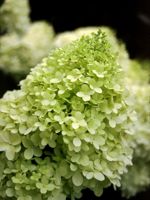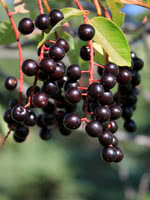Mon-Fri 9am - 5pm Mountain time
Western Chokecherry vs Limelight Hydrangea
Hydrangea paniculata Limelight
Prunus virginiana var. demissa
NOT AVAILABLE THIS SEASON - MIGHT RETURN
Limelight Hydrangea is a flowering shrub that is known for its green flowers. As they mature, the flower colour changes from a pale green to a creamy white, followed by shades of pink and red. Hydrangea flowers persist longer compared to other flowering shrubs, blooming from late July into fall. They are a popular choice for flower arrangements.
The Limelight Hydrangea can be grown as a stand alone shrub, as a hedge, or incorporated into a flower garden. Blooms occur on new wood, so regular pruning is encouraged in late winter. This is an award winner from the Proven Winners® collection.
Western Chokecherry is a shrub or small tree commonly used for farmstead and field windbreaks.
It produces white flowers in the spring and edible dark purple fruit that matures between September and October. Its cherries are great for making for making jams, jellies or wine, but are not very palatable for raw eating.

